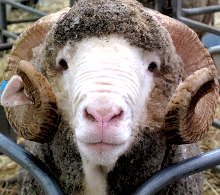Solar grazing praised
 Farmers say allowing their sheep to graze under solar panels appears to have improved their fleece.
Farmers say allowing their sheep to graze under solar panels appears to have improved their fleece.
Energy policy and landholder rights researcher Madeline Taylor says it is an exciting new approach.
“We're starting to get a really good database of studies showing how the co-location of agriculture and photovoltaics can be done successfully,” Dr Taylor says.
“We've seen that it works really well for grazing. Now, believe it or not, cropping can also really work very well alongside solar energy.”
Wool broker Graeme Ostini has been grazing merino sheep at a solar farm near Parkes in a trial with the Parkes Show Society.
He says his sheep have produced an “amazing” amount of wool.
“It is actually quite astonishing. Some of the sheep look fantastic. They're growing exponentially and the wool cuts are in the top 5 per cent in the district,” he told the ABC.
Dubbo farmer and grazier Tom Warren, who runs about 250 merino sheep on 54 hectares among solar panels, has also reported impressive results.
He says wool quality has improved.
“It'll be because of the conditions the sheep are living in,” he said.
“It's relatively clean, without burrs, without dust. There's very, very little contamination of the wool and they're protected from the sun as well.”
Additionally, he says he noticed that water condenses on the solar panels in the mornings, trickling down to the grass below and keeping strips of pasture green.
Leasing his land to the solar farm and grazing his sheep there has increased his overall income.
But not everyone is conveyed, with independent Wagga Wagga MP Joe McGirr calling for a moratorium on all solar farm developments until a review into the growth of renewable energy and agriculture commissioned by the NSW government is finished.
Mr McGirr says the idea of agriculture and solar farms co-existing has been “over-sold”.
“Landholders on neighbouring properties here are very concerned it's going to have a very bad effect in terms of dryland salinity,” he said.
“They're also very sceptical that more than a handful of sheep will be able to run on these properties,” Mr McGirr said.
“We're having the developments being done … and the discussion and research is going to come later.
“My concern is it will be too late, the damage will be done.”







 Print
Print